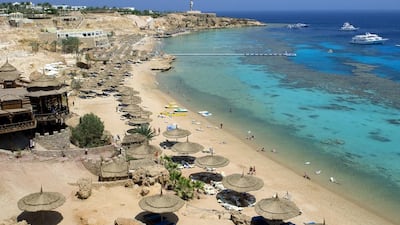Egypt is looking to increase its air connectivity with Gulf countries to check its falling tourism revenues in the face of travel warnings from Europe.
The tourism ministry, in partnership with its national carrier Egypt Air and hotels, will launch the “Wahashtouna” (we have missed you) campaign for Arab and Gulf countries.
Besides looking to convince UAE carriers to fly directly to its Red Sea resorts, the only bright spot in the tourism landscape, the counmtry will have Egypt Air and Egypt Air Express launch direct flights from Jeddah to Hurghada, its third largest city, from May 20.
A day later the low-cost airline Air Cairo will connect Kuwait to Hurghada.
As a result, the number of direct flights from Gulf countries to Hurghada and Sharm El Sheikh will rise to 18 per week from 12. The Red Sea resorts attracted 6.7 million visitors, or 71 per cent of the total tourists visiting Egypt, last year.
Visitors from the UAE, Saudi Arabia and Kuwait can also opt for tailor-made packages starting at US$400 that include air tickets and three-night stays in Sharm El Sheikh and Hurghada.
“The marketing campaign will be focused on Europe, Arab region and India,” said Hisham Zaazou, Egypt’s tourism minister.
Almost 73 per cent of its 9.5 million tourists were from Europe, and 20 per cent from the Arab world last year. Some 21,000 of these were Emiratis, down from 27,000 in 2012.
The total tourist numbers fell 18 per cent from the previous year.
Last year, Egypt spent $3.5 million on marketing in the region.
“For every $9 we spend on tourists, we get back $64,” Mr Zaazou said.
The push into new markets such as India, China, South Korea and Latin America is expected to offset the slowdown in tourist numbers from Europe. Some European countries had issued travel warnings following the president Mohammed Morsi’s removal last June.
“National security is the priority and the two revolutions have a tax that we are paying now,” Mr Zaazou said. “But we can absorb this negative impact.”
He also said that he was looking for foreign investment. Arab investments in Egypt’s tourism amounted to 2.18 billion Egyptian pounds (Dh1.13bn) last year.
Mr Zaazou is looking at US$40 million a year budget up from $10m in 2013 for the next three years to revive the sector.
There are investment opportunities worth $500m in tourism projects such as a marina complex with hotels along the Red Sea and Suez Canal, spas and resorts, he said.
Despite the positive notes from the minister, tourists have largely stayed away. Cairo hotels have struggled to recover from the impact of the popular uprisings and related violence since 2011.
“The outbound markets, mainly Europe, are insecure about where Egypt is going, but that said the destination will pick up and the hotels have proved resilient,” said Nicolas Mayer, a partner in lodging and tourism at the consultancy PricewaterhouseCoopers.
Occupancy levels in the Egyptian capital fell to 39 per cent during March, down 2.9 percentage points from the same period last year, according to HotStats data from TRI Hospitality Consulting.
Average room rates, however, climbed 3.2 per cent to $113.50. But the drop in demand meant there was a decline in the revenues per available hotel room to $44.25.
The average spending by tourists have also been falling. It has slipped from $85 per person a day in 2012 to about $60 now. The average length of stay has also declined to 8.2 nights from 11.
Tourism revenues in Egypt fell 43 per cent in the first quarter to $1.3bn. For the whole of last year, revenue was $5.8bn from 14.7 million tourists, down from $12.5bn in 2010, which was nearly double those pulled in by the Suez Canal, according to Mr Zaazou.
Egypt, which currently has 225,000 hotel rooms, has 2,966 more under construction. That includes a 163-room property from Dubai’s Time Hotels in Luxor expected at the end of the year.
“The projects there have not halted and is a sign that shows the developers are confident these assets will actually be rented out,” Mr Mayer said.
A large population means the sector can bounce back with a revival of domestic tourism, he said.
Last week, blasts, suicide bombs and clashes involving anti-government protesters killed five people across the country.
“These activities are likely to have a knock-on effect on the resumption of tourism and on any future increase in FDI, thereby affecting the country’s ability to recover economically,” according to a note on the country from research company IHS.
It forecasts that there will be no letting down of terrorist activities any time soon, and the situation will “remain severe” beyond the May 26 and 27 presidential election, with a spike in attacks around the parliamentary elections.
ssahoo@thenational.ae
Follow us on Twitter @Ind_Insights

